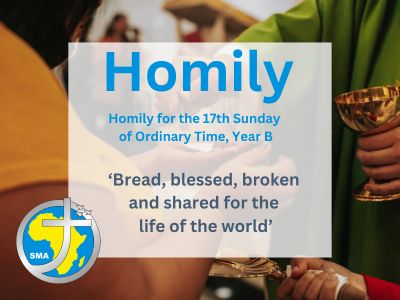Readings: 2 Kings 4: 42-44; Ephesians 4:1-6; John 6:1-15
Theme: Bread, blessed, broken and shared for the life of the world
While on a sabbatical programme in Jerusalem in the Spring of 2008, I had the privilege to visit the ‘Church of the Multiplication’ in Tagbha on the northwest shore of Sea of Galilee. On the floor of this Church is a famous mosaic commemorating the event recounted in today’s gospel. The mosaic depicts two fish with a basket of loaves between them. Noticing that there are only four loaves in the basket, we might wonder where is the fifth? Is it Jesus himself, the bread come down from heaven to be the life of the world? Or is it the Eucharistic community, fed by Christ and called, in turn, to be food and sustenance for a hungry world? It is both. All three readings today resonate with Eucharistic themes and give us a deeper appreciation of this great sacrament, the pulsating heart of the Church’s life.
Our first reading, taken from the second book of Kings, tells the story of how Elisha, during a time of famine, feeds 100 hungry men with twenty-five barley loaves and some ears of corn. Barely bread was considered to be the bread of the poor and, in the early Church, it was this bread that was used for the Eucharist. Today’s gospel, taken from the sixth chapter of John’s Gospel, echoes while surpassing the miracle of Elisha. It recounts the familiar story of the multiplication of the five barley loaves loaves and two fish, common to all four gospels. While illustrating the practical compassion of Jesus, the story has a deeper significance in John’s gospel. John, the only evangelist who has no account of the institution of the Eucharist, models his story of how Jesus feeds the five thousand on what happens in every Eucharist. Jesus takes the bread offered by a young boy, gives thanks for what has been offered, and shares the food with all present.
In the second reading, taken from his Letter to the Ephesians, Paul, writing from prison, reminds the community at Ephesus that they have received one Spirit and form one body. Hence, he exhorts them: ‘Do all you can to preserve the unity of the Spirit in the peace that binds you together’ (Eph 4:5). This unity in the Spirit is the fruit of the Eucharist, of partaking of the Body of the Lord. The word, ‘Eucharist’, comes from a Greek word and means ‘thanksgiving’. In the Eucharist, we give thanks for Christ present as the food that nourishes and strengthens us. The Eucharist is Christ’s communion with us. It is, at the same time, our communion with one another. Christ desires to be with us in the most complete way possible. This is what happens in the Eucharist. He comes to us. He enters into us, taking possession of our hearts, minds and bodies. He becomes one with us. And he wants to make us one with him. However, we cannot be in communion with Christ without being in communion with one another.
This recognition of the unity of all who partake of the Body of Christ is expressed in several ways in the Mass: in the common acknowledgement that we are sinners, the common responses, the songs of praise, the Gloria, the Creed, the acclamation of faith, the Great Amen, and the kiss of Peace, sadly a rite that has fallen into abeyance since the outbreak of the Covid pandemic. We act as one body because we are made one body in Christ. As he held up the Sacred Host before his congregation, St Augustine used to remind them of their essential vocation with these words: ‘Behold what you are, become what you receive.’ We become the body of Christ when we receive Christ, the Bread of life, in Communion, and our mission is to be, in turn, the body of Christ for others.
The Eucharist which affirms and strengthens our identity as the body of Christ ends with a sending out on mission: ‘Go in Peace to love and serve the Lord’. We must bring the Bread of Christ for our broken and hungry world. Just as Christ has become our food, giving himself completely to us, so we, in turn, must give of ourselves for the sake of the world. We must become sources of nourishment for the world as Christ has become a source of nourishment for us. Recently, a friend send me a short anonymous story that illustrates this dimension living of our Christian vocation perfectly. It is entitled The Story of the Lost Hands.
One morning as I knelt and prayed,
I gazed at the statue of Christ in clay
And lo! to my dismay, he had no hands and arms that sway.
I searched around, and searched from roof to ground,
his wounded hands could not be found.
So I turned to him and asked our Lord:
Why, in his glorious seat
He seemed to be incomplete?
Then kindly he replied:
YOU ARE MY HANDS:
heal the wounds of the afflicted;
care for the poor;
give hope to the helpless;
reach out to the weary;
clothe the naked.
By doing this my child…you will
RESTORE MY HANDS.
So we pray: Loving Father, help us to live our vocation as the Body of Christ by serving others generously ‘in complete selflessness, gentleness and patience’, in our everyday lives. Amen.
Click on the play button below to listen to an alternative homily from Fr Tom Casey SMA.

